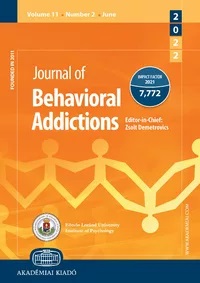Affective impulsivity moderates the relationship between disordered gambling severity and attentional bias in electronic gaming machine (EGM) players
Affective impulsivity moderates the relationship between disordered gambling severity and attentional bias in electronic gaming machine (EGM) players
Author(s): Hyoun S. Kim, Emma V. Ritchie, Christopher R. Sears, David C. Hodgins, Kristy R. Kowatch, Daniel S. McGrathSubject(s): Behaviorism
Published by: Akadémiai Kiadó
Keywords: attentional bias; impulsivity; urgency; eye gaze tracking; gambling disorder; electronic gaming machines
Summary/Abstract: Background and aims. Attentional bias to gambling-related stimuli is associated with increased severity of gambling disorder. However, the addiction-related moderators of attentional bias among those who gamble are largely unknown. Impulsivity is associated with attentional bias among those who abuse substances, and we hypothesized that impulsivity would moderate the relationship between disordered electronic gaming machine (EGM) gambling and attentional bias. Methods. We tested whether facets of impulsivity, as measured by the UPPS-P (positive urgency, negative urgency, sensation seeking, lack of perseverance, lack of premeditation) and the Barratt Impulsiveness Scale-11 (cognitive, motor, non-planning) moderated the relationship between increased severity of gambling disorder, as measured by the Problem Gambling Severity Index (PGSI), and attentional bias. Seventy-five EGM players participated in a free-viewing eye-tracking paradigm to measure attentional bias to EGM images. Results. Attentional bias was significantly correlated with Barratt Impulsiveness Scale-11 (BIS-11) motor, positive urgency, and negative urgency. Only positive and negative urgency moderated the relationship between PGSI scores and attentional bias. For participants with high PGSI scores, higher positive and negative urgency were associated with larger attentional biases to EGM stimuli. Discussion. The results indicate that affective impulsivity is an important contributor to the association between gambling disorder and attentional bias.
Journal: Journal of Behavioral Addictions
- Issue Year: 11/2022
- Issue No: 2
- Page Range: 386-395
- Page Count: 10
- Language: English

